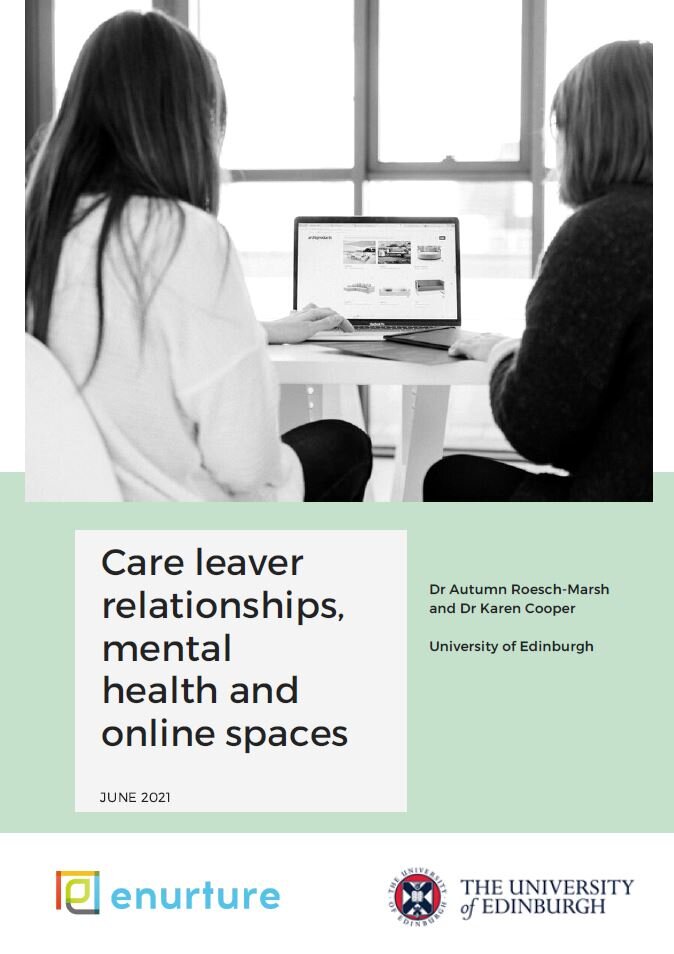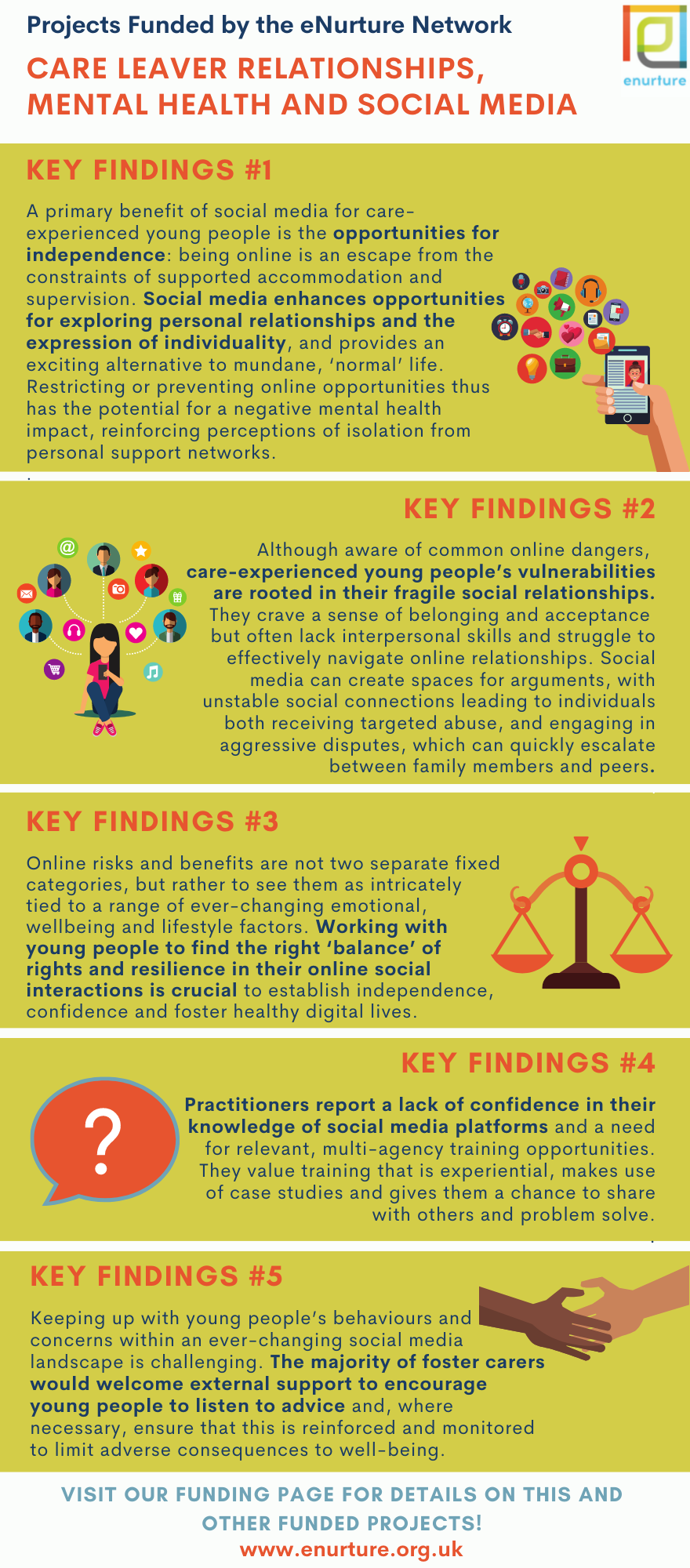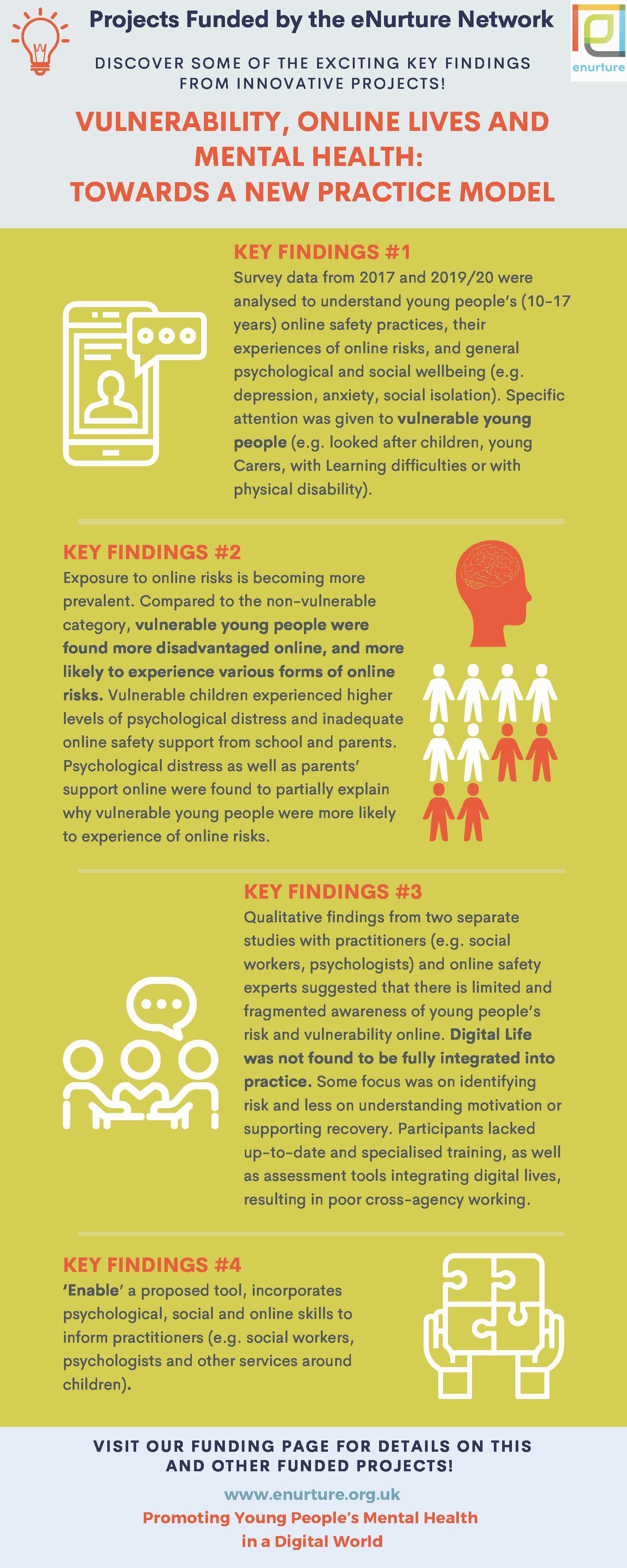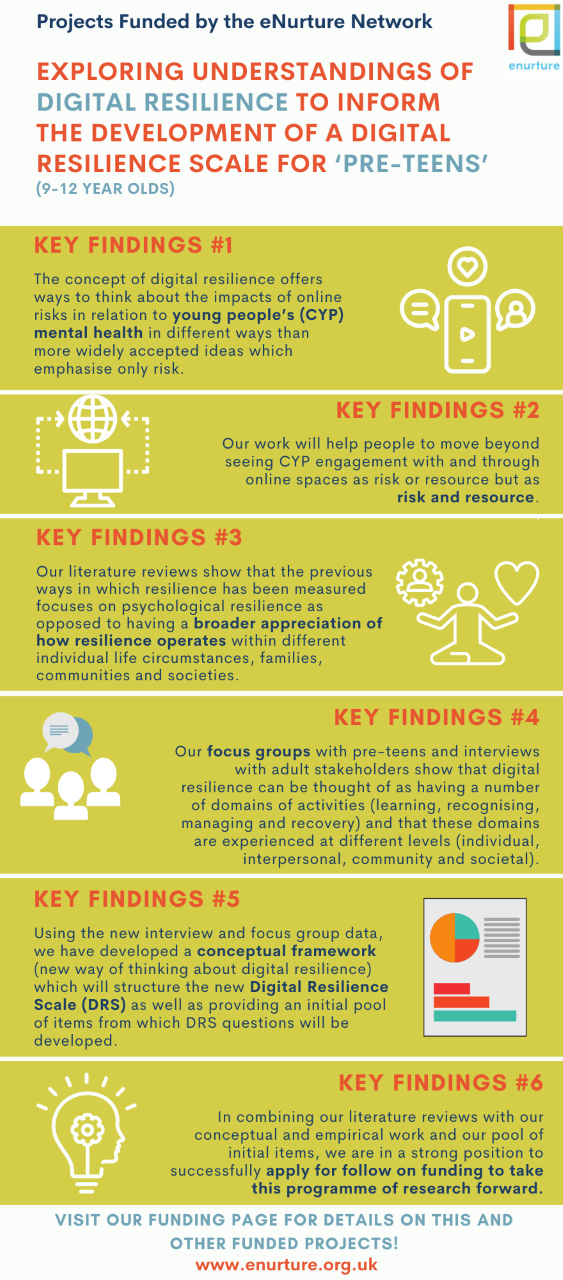- FUNDED PROJECTS -
Projects Funded in Round 1
Four of the 5 projects we supported in our 1st funding call completed successfully in 2020-21.
Read about the exciting key findings from these amazing projects.
Care leaver relationships, mental health and online spaces
Vulnerability, Online Lives and Mental Health: Towards a New Practice Model
Exploring understandings of digital resilience to inform the development of a Digital Resilience Scale (DRS) for ‘pre-teens’ (9-12 year olds)
Prototyping TangToys (Tangible Toys to Improve Mental Health): Explorative work for designing digital technology for and with Children with Intellectual Disability
GameSym: Gaming, Livestreaming, Esports & Youth Mental Health Symposium
Care leaver relationships, mental health and online spaces
Watch this short film based on findings from the research and made with young people. Animation by Wilfred Magnussen and Wali Hall for the Articulate Cultural Trust
Lead applicant: Dr Autumn Roesch-Marsh, University of Edinburgh
Co-applicants/partners:
Dr Karen Cooper, University of Edinburgh
Charlie Hackett, Robert Gordon University, Aberdeen
Dr Ruth Emond, University of Stirling
Dr Kate Orton-Johnson, University of Edinburgh
Dr Robin Sen, University of Sheffield
Dr Maggie Grant, Adoption and Fostering Scotland
Professor Emily Munro, University of Bedfordshire
Professor Jonathan Wyatt, University of Edinburgh
Aftercare Service and Transition Team and the Young People’s Working Group @ Dean and Cauvin Young People’s Trust
Articulate Cultural Trust
Grant awarded: £44,999
Duration: 12 months
project summary
Using participatory arts based group work and interviews with young people, focus groups with professionals, and knowledge exchange events, the aims of this project were: to better understand which social media platforms young people leaving care use to make and maintain relationships; what they hope for from these relationships; what they see as the risks and benefits of these environments for their relationships and their mental health; and what kind of training for professionals might improve support for young people. The objectives of the project were to develop and pilot some training materials for use with staff and young people around these issues and to apply for further funding to follow up key themes identified in the pilot study. Research methods comprised two exploratory focus groups; in-depth interviews with five individuals; and an interactive, creative art workshop to discuss ideas in a more fun and engaging way. We also worked with a group of young people from the Articulate Trust to produce a short animated film capturing some of the themes of the project for knowledge exchange purposes. We also commissioned eight care experienced artists to make works of art relating to the theme of social media and mental health. These artistic outputs will be going up on the website soon.
Key Findings From the Research
A primary benefit of social media for care-experienced young people is the opportunities for independence: being online is an escape from the constraints of supported accommodation and supervision. Social media enhances opportunities for exploring personal relationships and the expression of individuality, and provides an exciting alternative to mundane, ‘normal’ life. Restricting or preventing online opportunities thus has the potential for a negative mental health impact, reinforcing perceptions of isolation from personal support networks.
Although aware of common online dangers, care-experienced young people’s vulnerabilities are rooted in their fragile social relationships. They crave a sense of belonging and acceptance but often lack interpersonal skills and struggle to effectively navigate online relationships. Social media can create spaces for arguments, with unstable social connections leading to individuals both receiving targeted abuse, and engaging in aggressive disputes, which can quickly escalate between family members and peers.
Online risks and benefits are not two separate fixed categories, but rather to see them as intricately tied to a range of ever-changing emotional, wellbeing and lifestyle factors. Working with young people to find the right ‘balance’ of rights and resilience in their online social interactions is crucial to establish independence, confidence and foster healthy digital lives.
Practitioners report a lack of confidence in their knowledge of social media platforms and a need for relevant, multi-agency training opportunities. They value training that is experiential, makes use of case studies and gives them a chance to share with others and problem solve.
Keeping up with young people’s behaviours and concerns within an ever-changing social media landscape is challenging. The majority of foster carers would welcome external support to encourage young people to listen to advice and, where necessary, ensure that this is reinforced and monitored to limit adverse consequences to well-being.
OUTPUTS from the project
Roesch-Marsh, A., McGhee, K. and Gillon, F. (2021) The Digital Divide: The impact on rights of care leavers in Scotland. CELCIS research report on digital exclusion of care leavers.
Roesch-Marsh, A. (2020) Digital Exclusion and Care Leavers: It's time for social work to join this fight. Social Work 2020 under Covid-19 Magazine
Vulnerability, Online Lives and Mental Health: Towards a New Practice Model
Lead applicant: Dr. Aiman El Asam, Kingston University London
Co-applicants/partners:
Adrienne Katz, Youthworks Consulting
Claire Levens, Internet Matters
Dr Cathy Street, Consultant
Professor Andy Phippen, University of Plymouth
Grant awarded: £44,381
Duration: 12 months
project summary
Vulnerable young people face many challenges. Practitioners and professionals address these; but are often unaware of the young person’s digital life and the role that might play in their wellbeing and mental health. The main aim of this feasibility project is to develop an evidence-based practice model (Enable) that incorporates the digital aspect to enable interventions and support to be more effective. The objectives are to:
Examine the relationships between mental/emotional health and digital lives (internet-related experiences) amongst children and adolescents (Young People).
Explore frontline practitioners’ opinions on digital lives/experiences of vulnerable young people relative to their mental health.
Propose a draft practice model to assist decision-making and alert users to contextual aspects of their clients’/patients’ digital lives. Based on research, plus frontline skills and experience, teamed with online safety advice, this suite could be a vital contribution to the care of young people at risk.
Key findings from the research
Survey data from 2017 (n=1,993) and 2019/20 (n=15,278) were analysed to understand young people’s (10-17 years) online safety practices, their experiences of online risks, and general psychological and social wellbeing (e.g. depression, anxiety, social isolation). Specific attention was given to vulnerable young people (e.g. looked after children, young Carers, with Learning difficulties or with physical disability). Data was generated from different geographical locations in England to improve generalisability.
Regardless of vulnerability, exposure to online risks is becoming more prevalent. Compared to the non-vulnerable category, vulnerable young people were found more disadvantaged online, and more likely to experience various forms of online risks. Vulnerable children experienced higher levels of psychological distress and inadequate online safety support from school and parents. Psychological distress as well as parents’ support online were found to partially explain why vulnerable young people were more likely to experience of online risks.
Qualitative findings (n=43) from two separate studies with practitioners (e.g. social workers, psychologists) and online safety experts suggested that there is limited and fragmented awareness of young people’s risk and vulnerability online. Digital Life was not found to be fully integrated into practice. Some focus was on identifying risk and less on understanding motivation or supporting recovery. Participants lacked up-to-date and specialised training, as well as assessment tools integrating digital lives, resulting in poor cross-agency working.
‘Enable’, a proposed tool, incorporates psychological, social and online skills to inform practitioners (e.g. social workers, psychologists and other services around children).
PublicationS from the project
Katz, A & El Asam, A. (2021) Refuge and Risk Report: Life Online for Vulnerable Young People. Internet Matters and Youthworks.
El-Asam, A., Katz, A., Street, C., Nazar, N.M., Livanou,M. (2021) Children’s services for the digital age: A qualitative study into current procedures and online risks among service users. Children and Youth Services Review, Vol 122, 105872, ISSN 0190-7409, https://doi.org/10.1016/j.childyouth.2020.105872
Katz, A. & El Asam, A. (2020) Look At Me: Teens, sexting and risks. Internet Matters
Exploring understandings of digital resilience to inform the development of a Digital Resilience Scale (DRS) for ‘pre-teens’ (9-12 year olds)
Lead applicant: Dr Simon P Hammond, University of East Anglia
Co-applicants/partners:
Dr Kimberley Bartholomew, UEA
Dr Richard Graham, Clinical Director, Good Thinking: The London Digital Mental Well-being Service
Grant awarded: £24,853.25
Duration: 9 months
project summary
Digital resilience (DR) is a term increasingly used by various stakeholders and cited as playing a key role in promoting positive, whilst buffering negative, influences of digital environments on young people’s mental health. However, despite its uses, the research-informed evidence-base underpinning DR is embryonic. Interventions rely on low quality evidence, leaving practitioners to struggle to optimise content and/or delivery method(s) due to a lack of a focused robust evaluative scale.
Using the UKCIS definition of DR as a starting point, we developed a Digital Resilience Scale (DRS) to address this practice, research and policy gap. In the first instance, the scale will target ‘pre-teens’ (9-12 year olds) as this period is particularly important in promoting positive mental health trajectories. This project involved:
A literature review to develop conceptual knowledge, identify possible subcomponents and relevant previous scales (e.g. Patient Activation Scale, Scale of Protective Factors and Connor-Davidson Resilience Scale);
Work with stakeholders (including young people, parents/guardians and children’s workforce professionals) to co-produce an exploration of stakeholder’s understandings of DR;
The development of initial pool of items for DRS.
Key findings from the research
The concept of digital resilience offers ways to think about the impacts of online risks in relation to young people’s (CYP) mental health in different ways than more widely accepted ideas which emphasise only risk.
Our work will help people to move beyond seeing CYP engagement with and through online spaces as risk or resource but as risk and resource.
Our literature reviews have shown that the previous ways in which resilience has been measured focuses on psychological resilience (i.e. focuses on the individual) as opposed to having a broader appreciation of how resilience operates within different individual life circumstances, families, communities and societies.
Our focus groups with pre-teens and interviews with adult stakeholders have shown that digital resilience can be thought of as having a number of domains of activities (learning, recognising, managing and recovery) and that these domains are experienced at different levels (individual, interpersonal, community and societal).
Using the interview and focus group data we collected, we have developed a conceptual framework (new way of thinking about digital resilience) which will structure the new Digital Resilience Scale (DRS) as well as providing an initial pool of items from which DRS questions will be developed.
In combining our literature reviews with our conceptual and empirical work and our pool of initial items, we are in a strong position to successfully apply for follow on funding to take this programme of research forward.
output from the project
Inclusive Digital Safety Hub with SWGfL and Internet Matters - part of COVID-19 response to support children young people with care experience, their carers and educators.
Prototyping TangToys (Tangible Toys to Improve Mental Health): Explorative work for designing digital technology for and with Children with Intellectual Disability
Lead applicant: Eiman Kanjo, Nottingham Trent University
Co-applicants/partners:
Prof. David Brown, Nottingham Trent University
Gosia M Kwiatkowska, University of East London, RIX Centre
Mr David S Stewart OBE, Oak Field School, Nottingham.
Professor Carrie Paechter, Nottingham Children Centre
Dr. Pratik Vyas, ECR, Nottingham Trent University
Grant awarded: £23,889
Duration: 12 months
project summary
The use of technology is commonplace in many homes and schools. Increasingly school based approaches are being explored as a way of addressing children’s mental health within school contexts to address problems like mood, affective and developmental disorders in children and young people with Intellectual Disability. Integrating technology within the whole school approach could lead to reduced levels of distress, improved mental health and improve communication among children and teachers/parents. This proposal addresses the unmet need for the availability of interventions for children with Intellectual Disability by developing an approach to technology development that emphasises therapeutic benefit using co-design techniques.
The project:
Explores how the co-creation of wearable and tangible interfaces can change the ways in which children with Intellectual Disability interact and communicate with their Peers, Teachers and Families, and what this can mean for their mental health (e.g., tackling Diagnostic Overshadowing).
Identifies the risks and opportunities stemming from the co-design of such technologies using both quantitative and qualitative methods when working with students with Intellectual Disability, their families, schools and professional agencies to improve their mental health outcomes.
Identifies how we co-design future research objectives and methods of dissemination of this new knowledge with our end user communities to best engage present and future practice models aimed at promoting positive mental health and reducing negative mental health trajectories for young people with Intellectual Disability (including those with Special Education Needs).
We form an essentially multi-disciplinary and cross-sectoral collaboration involving Computer Scientists, Social Scientists and those working in Special Education, working in collaboration with young people with ID.
Key findings from the research
Children are increasingly affected by mental health conditions and frequently find it challenging to communicate their emotions. Technological solutions may help children communicate their wellbeing digitally and receive support from one another. Advances in networking and sensors enable the real-time transmission of physical interactions. In this work, we pursue the design of multiple wellbeing Tangible Toys interfaces designed for children to improve their wellbeing by communicating with other children in school or playground settings.
TangToys that can capture and communicate emotions are needed more than before amid the current pandemic. Children are not able to hug or play with each other’s as they used before.
During an informal evaluation of our prototypes, people have acknowledged how TangToys can help counter the negative feeling anxious and of missing social interaction. TangToys enable children to feel socially connected while maintaining physical distancing. We also believe, that TangToys appear to offer a natural and non-obtrusive means towards interpreting and communicating emotions to others.
Publications from the project
Woodward, K., Kanjo, E., Brown, D., Harold, G. & Mcginnity, T.M.. (2021). In the hands of users with Learning Disabilities: Co-Designing Tangible Users Interfaces for Mental Wellbeing. 10.36227/techrxiv.13562693.v1. (Preprint)
Woodward, Kieran & Kanjo, Eiman & Brown, David & Inkster, Becky. (2020). TangToys: Smart Toys that can Communicate and Improve Children's Wellbeing. In Proceedings of UbiComp ’20. ACM, New York, NY, USA, 3 pages. https://doi.org/10.1145/1122445.1122456
Woodward, K. & Kanjo, E. (2020). iFidgetCube: Tangible Fidgeting Interfaces (TFIs) to Monitor and Improve Mental Wellbeing, IEEE Sensors Journal, doi: 10.1109/JSEN.2020.3031163.
Woodward, Kieran & Kanjo, Eiman & Brown, David & McGinnity, Thomas & Inkster, Becky & Tsanas, Athanasios & Macintyre, Donald. (2020). Beyond Mobile Apps: a Survey of Technologies for Mental Well-being. IEEE Transactions on Affective Computing. 21. 10.1109/TAFFC.2020.3015018.
GameSym: Gaming, Livestreaming, Esports & Youth Mental Health Symposium
Project Symposium
Policy Brief (March 2022) based on findings from the symposium
GameSym: Gaming, Livestreaming, Esports & Youth Mental Health Symposium June 2021
Lead applicant: Dr Matthew Hart, University of Leicester
Co-applicants/partners:
Athina Karatzogianni, University of Leicester
Di Levine, University of Leicester
Jonathan Ellicott, The Diana Award
Grant awarded: £7037
Duration: 12 months
project summary
The “GameSym” Symposium aligns with eNurture’s research objectives by aiming to address the following research challenge by coordinating the activities below:
Research Challenge: Strengthening partnerships between public, private and third sector stakeholders to address mental health issues affecting live streaming youth by managing risks and promoting opportunities in the environment of live streaming. Indicative activities include:
a. Providing an expert and innovative, yet impactful symposium, which situates youth engagement at its centre, and it is relevant for industry, government, live streaming company actors, charities and others, by bringing together mental health and adolescent development expertise with expertise regarding live streaming challenges and opportunities.
b. Advancing methodologies and databases for studying the interplay between live streaming and adolescent mental health, by investigating a particular widely popular under-researched emerging platform.
c. Producing a Policy Brief to explain the ‘enurturing’ needs associated with different mental health issues, identified in relation to live streaming, which is in turn to be live streamed and presented by young people on the Discord platform.
d. Developing a future funding proposal for eNurture with the aim to attract funding for a larger research project with symposium participants.





.png)